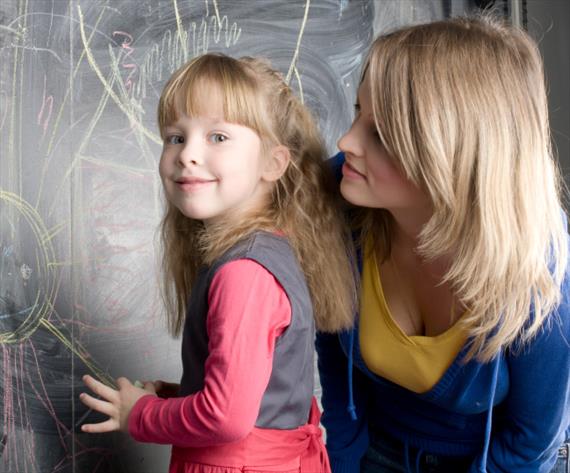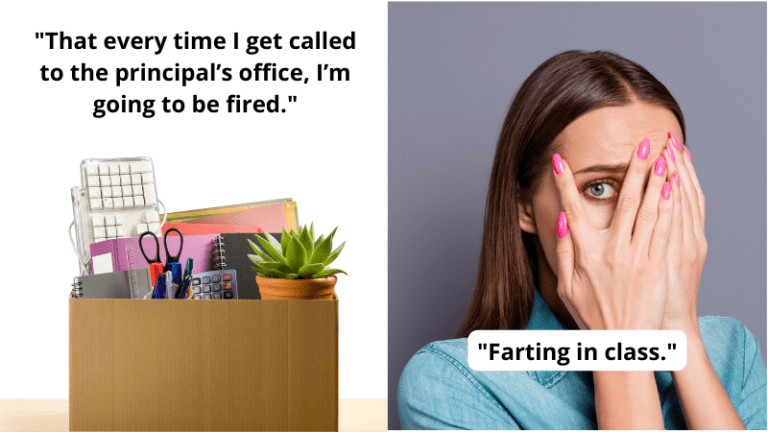by Jeanette Hanscome
After substituting for a Special Education teacher named Carolyn Brian twice, I accepted an assignment to fill in for her assistant. I could finally ask her the question that had been burning in my mind since I first heard the name Carolyn Brian over the automated Substitute Caller.
“Would you happen to be the same Carolyn Brian who used to work with visually impaired kids through the county back in the ’70s?”
She stepped closer like she was starting to make the connection too. “Yes,” she said.
“I think you worked with me and my sister.”
“What’s your name again?”
“Back then it was Jeanette La Chapell.”
“Oh, wow.” She smiled. “Yep, that was me.”
I gushed over how wonderful it was to see her again; she lamented over feeling old. We grabbed as many moments as we could to catch up throughout that school day. The last time we’d seen each other, I was finishing fourth grade. My sister Sherry and I were the first low-vision students at our school, so teachers still didn’t quite know what to do with us. But then we met Mrs. Brian and she seemed to know exactly what we needed to survive in a regular classroom. Not only did she work with visually impaired kids like us all the time, she had low vision herself. In fact, she was the first visually impaired person aside from my sister that I’d ever met. And she was a teacher! She even had a special device attached to her glasses that allowed her to drive.
Sherry and I loved our weekly trips to the resource room to meet with Mrs. Brian. We got our first large-print books and binder paper with super-dark lines and learned how to use a giant magnifying machine. The listening-skills tapes were a little boring (we always had to take a quiz for each one—boo!!!), but we also got to do cooking projects, crafts and other fun things that doubled as life skills.
Mrs. Brian never sat me down and said, “Jeanette, someday you will be a teacher too. I can just feel it. Don’t ever let your vision limitations hold you back.” Instead, she showed me by example and giving me the tools I needed to succeed.
And now, here I was, showing her that those lessons had made a difference. The same girl whose parents had received a lecture from an eye doctor on all the things that I would never do had a college degree, a family and a job. After benefitting from incredible Special Education classes, I was beginning to explore the possibility of finishing my credential and making that my focus.
Mrs. Brian no longer worked with the visually impaired, but her students—who mostly had learning, behavioral and emotional problems—adored her as much as Sherry and I had when we were girls. A week after we reconnected, Mrs. Brian’s assistant resigned, so she asked me to apply for the job and immediately began molding me to become a Special Ed teacher. We made a pretty funny team, both of us reading with our noses pasted to the page, taking turns whispering, “Can you read this? I forgot my magnifier.” But as I sat across the reading table with the woman who’d given me the first living example of my potential, I felt like things had come full circle.
There we sat, together, showing our class that students can grow up to become the teacher (we told them our backstory) and that even those who wear the “Special Ed” label have amazing potential to do big things. As we struggled to read the textbooks, I hope we modeled humility, the importance of being able to laugh at yourself, and that it’s perfectly OK for a teacher to have limitations—the key was not letting those limitations stop her.
A relocation put an end to my plan of becoming a Special Ed teacher and I moved on to become an author—another one of those things no one expected. I don’t think Mrs. Brian would be disappointed in me though, or that my time as her assistant was for nothing. What a gift to connect with the teacher who once inspired me, to show her that her work made a difference, and to seize the opportunity to be an example to a precious group of kids.
Who knows? Maybe someday I’ll meet one of Mrs. Brian’s students in a school setting, discover that he or she is one of the teachers, and hear, “Are you the same Jeanette Hanscome who used to be a Special Ed assistant?”
And I hope that they will also be doing all the things that everyone told them they could never do.
Jeanette Hanscome is the author of four books and many articles and stories. Her recent work includes Gifts: Volume 12 in the 12 Days of Christmas series, and Running with Roselle, co-written with blind 9/11 survivor Michael Hingson. Jeanette finds her best material in what she learns through life and faith, including living with low vision. Read more about Jeanette on her website and blog, http://jeanettehanscome.com/.

